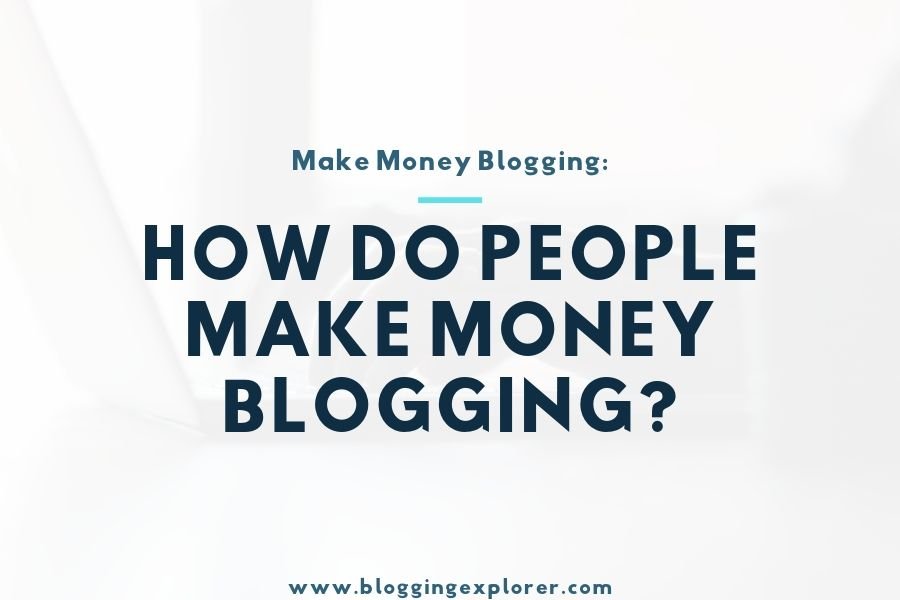Making money blogging has become a viable income stream for many individuals around the world. While it requires dedication, consistency, and patience, there are several proven methods bloggers use to monetize their content. Here’s a detailed explanation of how people make money blogging:
-
Display Advertising:
Display advertising is one of the most common ways bloggers earn money. By displaying ads on their websites, bloggers can generate revenue based on factors such as ad impressions, clicks, or actions taken by visitors. Google AdSense is a popular advertising network that allows bloggers to easily integrate ads into their content. Other ad networks, such as Mediavine and AdThrive, offer higher payouts for bloggers with larger audiences. -
Affiliate Marketing:
Affiliate marketing involves promoting products or services and earning a commission for each sale or referral generated through your unique affiliate link. Bloggers can join affiliate programs offered by companies and promote their products or services to their audience. Amazon Associates is a widely used affiliate program, but there are countless others in various niches. Successful affiliate marketing requires genuine recommendations and disclosure of affiliate relationships to maintain trust with your audience. -
Sponsored Content and Brand Partnerships:
Bloggers can collaborate with brands and businesses to create sponsored content, such as sponsored blog posts, reviews, or social media mentions. Brands pay bloggers to promote their products or services to their audience, leveraging their influence and reach. Successful brand partnerships require authenticity, relevance, and alignment with the blogger’s niche and audience preferences. -
Selling Digital Products:
Many bloggers create and sell digital products, such as ebooks, online courses, guides, templates, or printables, to monetize their expertise and knowledge. By leveraging their expertise in a particular topic or niche, bloggers can create valuable digital products that address their audience’s needs and pain points. Platforms like Gumroad, Teachable, or SendOwl make it easy for bloggers to sell and distribute digital products directly to their audience. -
Offering Services:
Bloggers with specialized skills or expertise can offer services related to their niche, such as consulting, coaching, freelance writing, graphic design, or virtual assistance. By leveraging their blog as a portfolio and showcasing their expertise, bloggers can attract clients and offer services on a freelance or consulting basis. Platforms like Upwork, Freelancer, or Fiverr provide opportunities for bloggers to find and connect with clients seeking their services. -
Membership or Subscription Models:
Some bloggers offer premium content or exclusive access to their audience through membership or subscription models. By creating a membership site or offering a subscription-based newsletter, bloggers can provide additional value to their most dedicated followers in exchange for a recurring fee. Platforms like Patreon or Substack facilitate the creation and management of membership-based content and communities. -
Events and Workshops:
Bloggers can host events, workshops, webinars, or conferences related to their niche to monetize their expertise and engage with their audience offline. By organizing live events or virtual workshops, bloggers can offer personalized experiences, networking opportunities, and access to exclusive content or speakers. Event ticket sales, sponsorships, or merchandise sales can generate revenue from these activities. -
Ad-Free Memberships:
Some bloggers offer ad-free memberships as an alternative to traditional display advertising. By charging a subscription fee, bloggers provide an ad-free browsing experience to their audience, eliminating distractions and enhancing the user experience. Ad-free memberships appeal to readers who value an uncluttered and distraction-free environment while supporting the blogger financially. -
Crowdfunding and Donations:
Bloggers can leverage crowdfunding platforms like Kickstarter, Indiegogo, or GoFundMe to raise funds for specific projects, initiatives, or creative endeavors. By engaging their audience and offering rewards or incentives, bloggers can encourage their supporters to contribute financially to their endeavors. Additionally, bloggers can accept donations directly from their audience through platforms like PayPal, Patreon, or Buy Me a Coffee. -
Selling Physical Products:
Some bloggers create and sell physical products related to their niche, such as merchandise, apparel, accessories, or specialty items. By leveraging their brand and audience, bloggers can create unique and branded products that resonate with their audience and drive sales. E-commerce platforms like Shopify, WooCommerce, or Etsy provide tools to set up and manage online stores for selling physical products.
In conclusion, people make money blogging through a combination of methods, including display advertising, affiliate marketing, sponsored content, selling digital products, offering services, membership models, events and workshops, ad-free memberships, crowdfunding, and selling physical products. Successful monetization requires understanding your audience, providing value, building trust, and experimenting with different monetization strategies to find what works best for your blog and niche. By diversifying revenue streams and consistently delivering high-quality content, bloggers can build sustainable income streams and turn their passion for blogging into a profitable venture.

